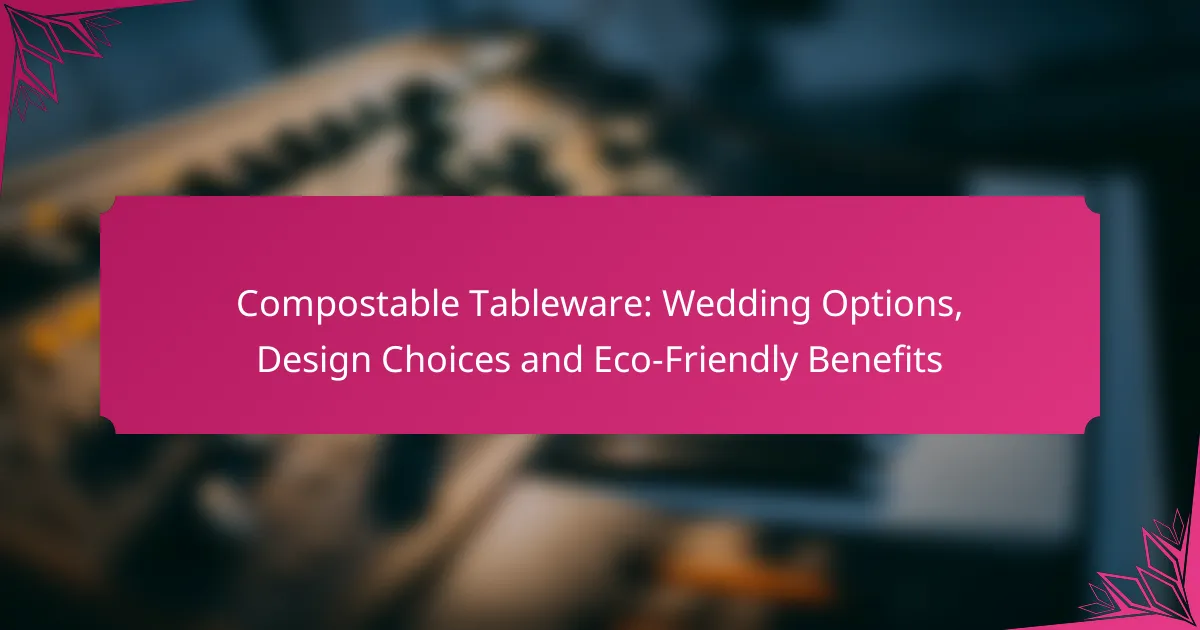Compostable tableware is an excellent choice for weddings, offering a range of biodegradable options such as plates, cups, and cutlery that enhance the celebration’s aesthetic while supporting eco-conscious values. Thoughtful design choices can elevate the overall theme of the event, ensuring that sustainability is at the forefront. By opting for these eco-friendly alternatives, couples can significantly reduce their environmental impact and promote a healthier planet.
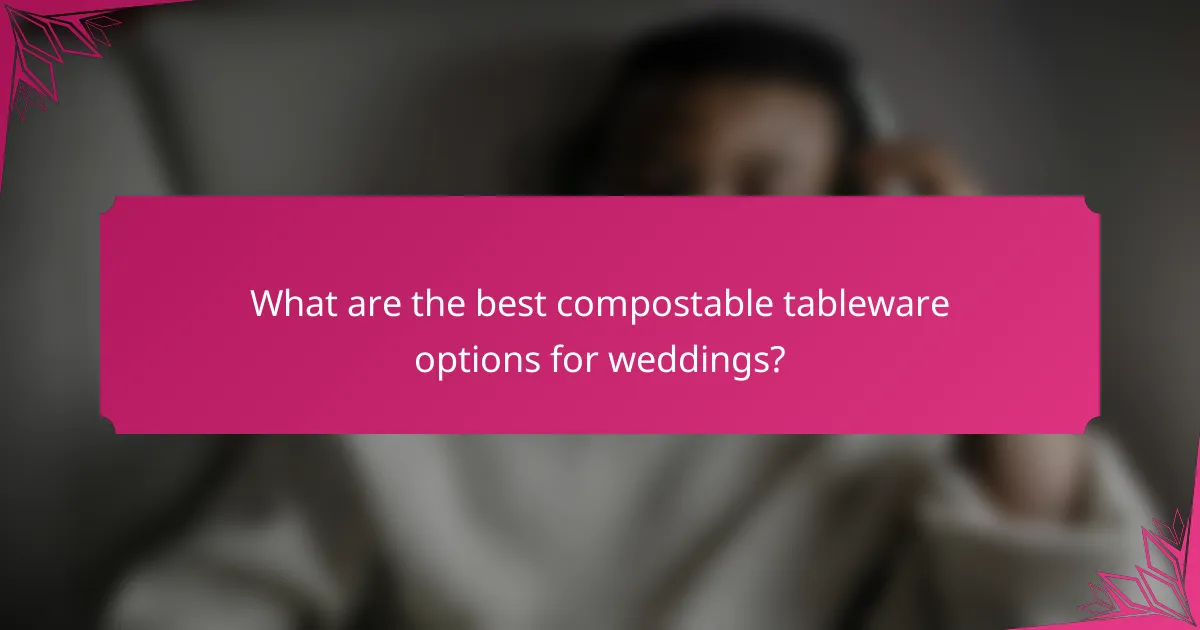
What are the best compostable tableware options for weddings?
The best compostable tableware options for weddings include biodegradable plates, compostable cups, eco-friendly cutlery, leaf-based serving trays, and plant fiber bowls. These options not only enhance the wedding’s aesthetic but also align with eco-conscious values, making them ideal for sustainable celebrations.
Biodegradable plates
Biodegradable plates are made from materials like sugarcane, bamboo, or palm leaves, which break down naturally over time. They are sturdy enough for various dishes, from appetizers to desserts, and typically come in a range of sizes. When selecting biodegradable plates, consider their durability and whether they can hold both hot and cold foods without leaking.
Look for plates that meet composting standards, such as ASTM D6400 or EN 13432, to ensure they will decompose effectively in commercial composting facilities.
Compostable cups
Compostable cups are designed to hold beverages while breaking down in composting environments. Made from materials like PLA (polylactic acid) or paper lined with a biodegradable coating, these cups are suitable for both hot and cold drinks. When choosing compostable cups, ensure they are labeled as compostable and check their compatibility with your local composting facilities.
Many brands offer cups in various sizes, so consider your beverage options and guest count when selecting the right size for your wedding.
Eco-friendly cutlery
Eco-friendly cutlery options include utensils made from biodegradable materials such as cornstarch, bamboo, or wood. These alternatives provide a sturdy option for guests while minimizing environmental impact. When selecting cutlery, consider the type of cuisine being served to ensure the utensils are appropriate for the meal.
It’s helpful to provide a mix of forks, knives, and spoons, and consider offering compostable napkins to complement the cutlery for a cohesive eco-friendly dining experience.
Leaf-based serving trays
Leaf-based serving trays, often made from palm leaves, provide a unique and rustic presentation for food. These trays are sturdy and can hold a variety of dishes, making them ideal for buffet-style service or appetizers. They are fully compostable and add an organic touch to the wedding decor.
When using leaf-based trays, ensure they are sourced sustainably, and consider their size and shape for effective food presentation.
Plant fiber bowls
Plant fiber bowls, made from materials like sugarcane or wheat straw, are versatile and suitable for serving salads, sides, or desserts. These bowls are designed to be sturdy and can handle both hot and cold foods. When selecting plant fiber bowls, check their compostability certification to ensure they will break down properly after use.
Consider offering a variety of bowl sizes to accommodate different dishes and serving styles, enhancing the overall dining experience for your guests.
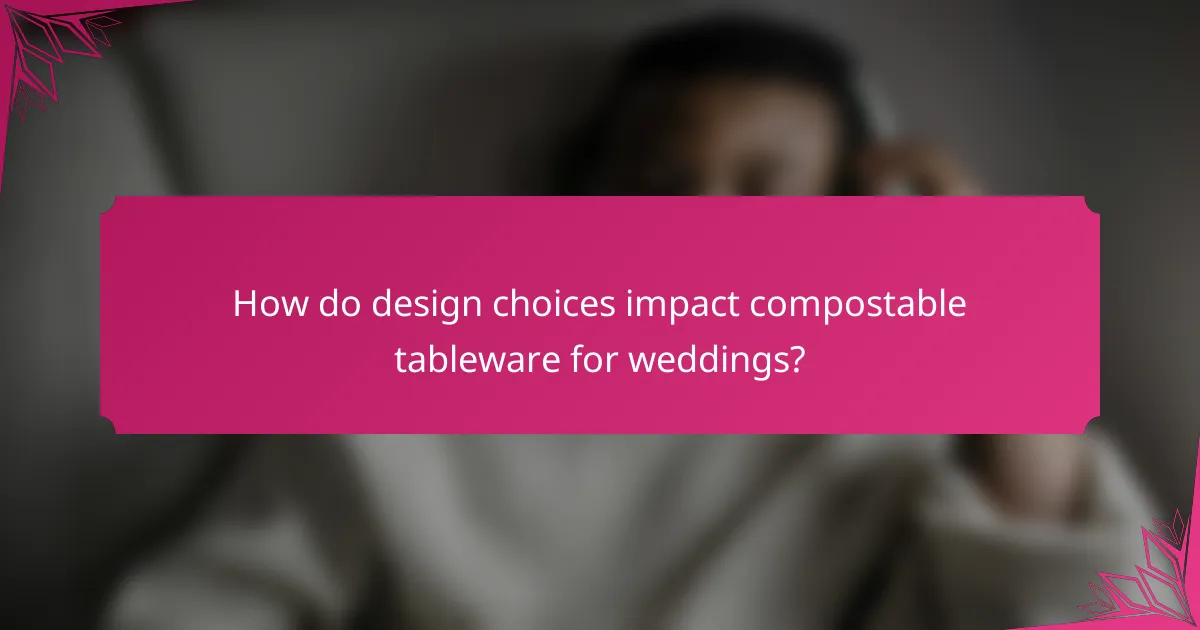
How do design choices impact compostable tableware for weddings?
Design choices significantly affect the aesthetics, functionality, and sustainability of compostable tableware for weddings. Selecting the right designs can enhance the overall theme while ensuring that the materials used align with eco-friendly values.
Customizable designs
Customizable designs allow couples to reflect their unique style and wedding theme through their tableware. Options may include personalized prints, shapes, and sizes that cater to specific needs, such as dinner plates, dessert dishes, or even cutlery. Many suppliers offer customization services, enabling you to create a cohesive look that resonates with your wedding’s atmosphere.
When considering customization, think about your color palette and overall theme. Ensure that the designs complement your decorations, enhancing the visual appeal without overwhelming the space.
Color options for themes
Color options play a crucial role in aligning compostable tableware with your wedding theme. Many manufacturers provide a range of colors, from classic whites and pastels to vibrant hues that can match seasonal themes. Choosing the right colors can create a harmonious look that ties together floral arrangements, linens, and other decor elements.
Consider the season when selecting colors; for instance, earthy tones work well for fall weddings, while bright colors may suit summer celebrations. Ensure that the colors of your tableware are not only aesthetically pleasing but also made from non-toxic, eco-friendly dyes.
Branding opportunities
Branding opportunities with compostable tableware can enhance your wedding’s personal touch. Couples can incorporate their names, wedding date, or a meaningful quote on the tableware, making each piece a memorable keepsake for guests. This approach not only personalizes the dining experience but also reinforces the couple’s identity as a pair.
When exploring branding options, ensure that the printing methods used are compatible with the compostable materials. Opt for water-based inks or other eco-friendly alternatives to maintain the sustainability of your tableware while achieving a polished look.
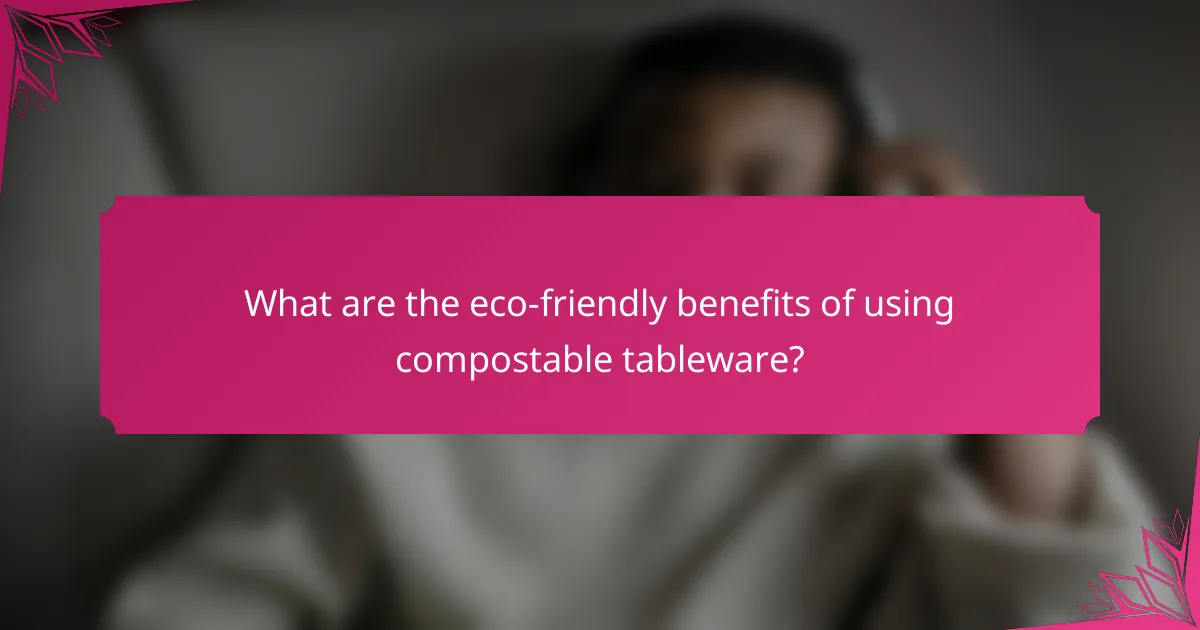
What are the eco-friendly benefits of using compostable tableware?
Compostable tableware offers significant eco-friendly benefits, primarily by reducing environmental impact and promoting sustainability. These products are designed to break down naturally, minimizing waste and supporting a healthier planet.
Reduces landfill waste
Using compostable tableware significantly reduces landfill waste by providing an alternative to traditional plastic and Styrofoam products. When disposed of properly, these items can decompose in composting facilities, diverting waste from landfills where it would otherwise take years to break down.
For example, compostable plates and utensils can help cut down on the volume of trash generated during events like weddings, where disposable items are commonly used. This reduction in waste contributes to a more sustainable waste management system.
Supports sustainable practices
Compostable tableware supports sustainable practices by encouraging the use of renewable resources. Many of these products are made from materials like corn starch, sugarcane, or bamboo, which are sourced from plants that can be replenished.
By choosing compostable options, individuals and businesses can align their practices with eco-friendly initiatives, promoting a circular economy. This choice not only benefits the environment but also appeals to eco-conscious consumers who prioritize sustainability.
Biodegrades naturally
Compostable tableware biodegrades naturally, breaking down into organic matter within a few months under the right conditions. This process contrasts sharply with conventional plastics, which can take hundreds of years to decompose.
To ensure effective biodegradation, it is essential to dispose of compostable items in a dedicated composting facility or home compost system. Proper conditions, including moisture and temperature, are vital for the breakdown process, making it crucial to follow local composting guidelines.

How to choose the right compostable tableware for your wedding?
Choosing the right compostable tableware for your wedding involves considering factors such as guest count, material types, and budget constraints. By evaluating these elements, you can select eco-friendly options that suit your event’s needs and aesthetic.
Consider guest count
Your guest count is a crucial factor in selecting compostable tableware. The more guests you have, the larger the quantity of plates, cups, and utensils you’ll need. It’s advisable to order a little extra to accommodate any last-minute additions or unexpected guests.
For example, if you expect around 100 guests, consider ordering for 110-120 people to ensure you have enough. This approach helps avoid running out of tableware during the event.
Evaluate material types
Compostable tableware is made from various materials, including bamboo, sugarcane, and PLA (polylactic acid). Each type has its own benefits and drawbacks, so it’s essential to evaluate them based on your wedding’s theme and food served.
Bamboo plates are sturdy and stylish, while sugarcane products are often more affordable. PLA is suitable for cold foods and beverages but may not hold up well with hot items. Consider your menu when selecting the material.
Assess budget constraints
Your budget will significantly influence your choice of compostable tableware. Prices can vary widely based on material, design, and brand. It’s important to set a clear budget for tableware early in the planning process.
For instance, while bamboo tableware might be more expensive, it can add a unique touch to your wedding. On the other hand, sugarcane options are typically more budget-friendly. Compare prices from different suppliers to find the best fit for your financial plan.
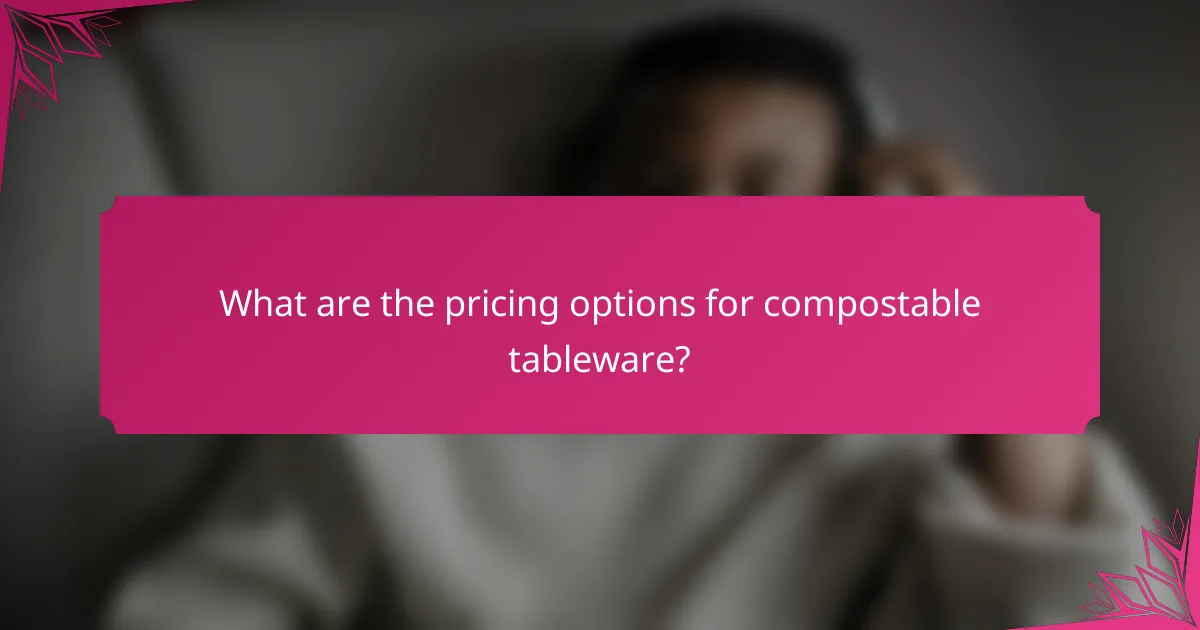
What are the pricing options for compostable tableware?
Pricing for compostable tableware varies based on factors like material, design, and quantity. Generally, buyers can find options that fit different budgets, making it accessible for events like weddings.
Bulk purchase discounts
Many suppliers offer bulk purchase discounts for compostable tableware, which can significantly reduce the per-unit cost. For weddings, where large quantities are needed, buying in bulk can lead to savings of 10-30% compared to retail prices.
When considering bulk orders, check with suppliers about minimum order quantities and available discounts. Some companies may offer tiered pricing, where the discount increases with the volume purchased.
Average price ranges
The average price for compostable plates typically ranges from $0.20 to $1.00 each, depending on size and material. Cups and utensils may fall within a similar range, with prices varying based on design and brand.
For a wedding, budgeting around $200 to $500 for tableware is common, depending on guest count and specific choices. It’s advisable to compare different suppliers to find the best deals within these ranges.
Comparative costs with traditional tableware
Compostable tableware often costs more than traditional plastic or paper options, which can be priced as low as $0.05 to $0.50 per item. However, the environmental benefits and convenience of compostable options can justify the higher cost for many couples.
When weighing costs, consider the total event expenses. While compostable tableware may have a higher upfront cost, it can reduce waste disposal fees and align with eco-friendly values, making it a worthwhile investment for sustainable weddings.

What are the shipping and return policies for compostable tableware?
Shipping and return policies for compostable tableware can vary by retailer, but most offer standard shipping options and a return window of around 30 days. It’s essential to check specific terms before purchasing to ensure a smooth experience.
Shipping options for compostable tableware
Many retailers provide various shipping options, including standard, expedited, and sometimes free shipping for orders over a certain amount. Typical shipping times range from 3 to 7 business days for standard delivery within the continental United States.
When ordering compostable tableware, consider the shipping costs, which may vary based on the weight of the items and the delivery location. Some companies may also offer international shipping, but this can lead to longer delivery times and additional fees.
Return policies for compostable tableware
Return policies for compostable tableware typically allow customers to return unopened items within 30 days of purchase. Some retailers may have stricter policies, so it’s crucial to read the fine print before buying.
To ensure a hassle-free return, keep the original packaging and receipt. If the tableware is damaged or defective upon arrival, most companies will cover return shipping costs, but it’s advisable to confirm this with the seller.
Considerations for shipping and returns
When purchasing compostable tableware, consider the environmental impact of shipping. Opting for local suppliers can reduce carbon footprints and support local economies. Additionally, be mindful of the packaging materials used for shipping, as some companies prioritize eco-friendly options.
Always check for customer reviews regarding shipping and return experiences. This can provide insights into the reliability of the retailer and the quality of their service, helping you make informed decisions.
